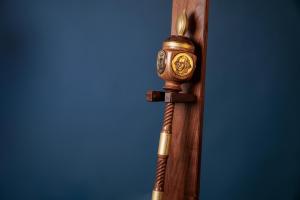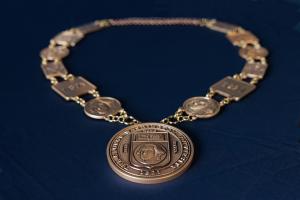Spirit and Traditions
It is traditional to end the university’s academic ceremonies with the Fight Song and Alma Mater. Those who are able are asked to stand during the playing of these songs. Students, faculty, staff, alumni, families, and guests should sing along to show their GW Revolutionaries pride!
Symbols of the University

The University Mace
A new university mace was commissioned for President Granberg’s inauguration in November of 2023. Historically, maces were used as weapons, first on battlefields and then to protect university rectors from mischief. The GW mace bears an image of George Washington and of the university’s seal as well as “1821” (the year the university was chartered by Congress).

The Chain of Office
The GW chain of office, worn by the president of the university as a symbol of authority, accents the president’s academic regalia. The university seal is supported by a chain of circles, squares and rectangles alternatively showing the letters “GW,” the year of the university’s charter in 1821 and an image of George Washington.
The seal of George Washington University incorporates an image of the head of George Washington, as painted by Gilbert Stuart. Above the image of Washington, an open Bible shows a Gospel verse in Greek. According to John 1:1-4, on the left page: “In the beginning was the Word, and the Word was with God, and the Word was God,” and, on the right page: “In Him was life, and the life was the light of men.” The words “Deus Nobis Fiducia,” (God in our trust) appear above and to the left and right.

Presidential Regalia
The presidential gown features four velvet chevrons on each sleeve—an honor reserved for university presidents—and is trimmed in a braided buff silk cord. The wool costume is completed with a tam in matching blue velvet and a gold bullion tassel. This symbol of office is worn at academic convocations, commencement and other occasions.
School Flags and Gonfalons
GW’s Commencement begins with the academic procession that includes the presentation of school flags, accompanied by gonfalons (banners hung from crossbars). The gonfalons reflect the university’s colors, buff and blue, with banners in colors representing that school’s field of study. Selected students from each of the university’s ten schools carry, or escort, their school’s flag and gonfalons and are presented in the order of the founding of their school or college.

The flag of the Columbian College of Arts and Sciences shows a book on a field of blue, representing philosophy.

The flag of the School of Medicine and Health Sciences shows the wand of Asclepius, the Greco-Roman god of medicine, against a green field.

The flag of GW Law has a figure of blind Justice with a sword to symbolize power and scales to represent the impartiality of law. Lady Justice is shown on a purple field, the traditional color of the legal discipline.

The flag of the School of Engineering and Applied Science bears an orange circle against a white background.

The Graduate School of Education and Human Development’s flag notes its commitment to lifelong learning with a torch and books against a light blue field.

On its flag, the School of Business presents its medal of achievement on a khaki-colored field.

The Elliott School of International Affairs has a flag showing the landmasses of the Earth against a white background and a red border.

The Milken Institute School of Public Health shows a green cross on its flag, against a salmon background with a green border.

The College of Professional Studies has a lighthouse against a beige background.

Last but not least, the flag of the School of Nursing portrays a shield with the lamp of learning against a background of apricot and navy blue.

